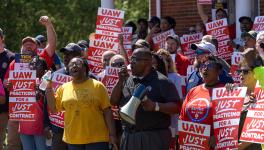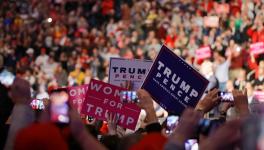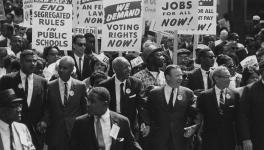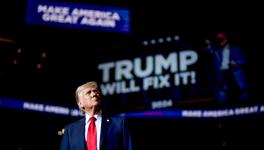Radical Journeys: Peace in Korea

South Korea’s Moon Jae-in and North Korea’s Kim Jong Un have reached out to each other in tangible ways. The North and South marched together in the Winter Olympics. Kim Yo Jong and other senior members of the North Korean government came to the Pyeongchang games and met with President Moon and his team. Discussions have been held across the border to calm tensions that had become very serious. Now, Moon has said that he would send an envoy to Pyongyang (North Korea) to continue these discussions.
South Korea’s President Moon has indicated that he wants North Korea to talk directly with the United States. It is – after all – the United States that has garrisoned North-West Asia with military bases from Japan down to the Philippines and it is the United States’ arsenal of nuclear, chemical and conventional weapons that the North fears. As our first Tricontinental: Institute for Social Research dossier shows us, it is the North’s genuine and well-considered dread of annihilation that drives its policy for nuclear weapons. Moon understands this and therefore wants the United States to give genuine and sincere consideration to the North’s anxiety.
US President Donald Trump – like his predecessors – is uninterested in any dialogue that would mean genuine de-nuclearization of the Korean peninsula and of North-East Asia. When the United States talks about de-nuclearization of the peninsula, it means that the North must give up its nuclear weapons. The United States does not understand the phrase to mean that it must close its bases in the region – which are equipped with nuclear submarines and other nuclear delivery systems – and that it must prevent its nuclear-armed ships from patrolling the territorial waters of Korea. What the United States has sought is the surrender of the North Koreans, not a dialogue for peace in the region.
The obduracy of the United States has been so extreme that even the US envoy to North Korea – Joseph Yun – has now resigned from his post. Yun, who has worked for thirty-two years in the US State Department, says he is leaving for personal reasons. A South Korean diplomat who has known Yun for a long time says that Yun was frustrated by Trump’s rhetoric and was unhappy that the United States rejected North Korea’s offer for talks. It was churlish that US Vice President Mike Pence did not stand up with others when the two Koreas marched into the Olympic stadium during the opening ceremony. This is the attitude that even professionals in the US government find objectionable.
But truly the hope that South Korea’s Moon or the US State Department’s Yun have that the United States would be sincere in its talks with North belies their own naiveté. From the 1950s onwards, as we show in our Tricontinental dossier, the United States government has been uninterested in peace in the region. It pursued a policy of war in order to prevent Korea from overthrowing capitalism; it battered the North into the Stone Age and forced it into a siege situation from which it has not been able to break out. There is little evidence that the United States, even under its most liberal administrations, has been interested in a dialogue that would de-militarize the peninsula. Each dialogue ends up with the US using economic force to make the North give up this or that part of its defensive shield. And all this continues to hold South Korea hostage to the United States’ own narrow view of its imperial ambitions.
North Korea has neither tested a bomb nor a missile since September. There are few indications that it is willing to go forward with a provocation. The government of North Korea appears committed to the dialogue with the South and it continues to propose a wider discussion with the United States. The South Korean diplomat suggests that the North would not be opposed to adding Japan to the list of countries with which it would like to hold a discussion. Even Japan’s Prime Minister Shinzo Abe, a hard right man, has indicated that his government would be happy to join informal talks with North Korea before the North gives up its nuclear arms programme (a previous requirement of the Japanese government).
In this climate of dialogue, a very spurious news report arrives about North Korea having delivered the raw materials for chemical weapons to Syria. This is a leak from what is to come in a United Nations report later this month. The evidence for this is from 2008. What appears to be new evidence is given by an unnamed member state of the United Nations. Nothing has been made public apart from the allegation. It ties North Korea to Syria, two countries pilloried in the corporate media as part of a self-evident Axis of Evil. There is little concern by this same media or by these same establishment liberals that the United States and the Federal Republic of Germany did indeed provide Iraq with chemical weapons in the 1980s, which were used against the Iraqi Kurds. That fact somehow escapes the imagination. It is neither the United States nor Germany that need to be held to any standard. It is merely North Korea and Syria – words that evoke ‘evil’ – that are to evoke horror.
The North Koreans denied reports that they had provided Syria with chemical weapons. The government said that these reports are a ‘fabrication’ and that the North ‘does not develop, produce and stockpile chemical weapons and opposes chemical weapons themselves’. North Korea has not signed nor ratified the Chemical Weapons Treaty (but neither has Egypt, Israel and South Sudan). But it has not used chemical weapons. On the other hand, the United States – which has signed the treaty and ratified it – uses toxic depleted uranium and white phosphorus in Iraq. It would be fitting for North Korea to now sign and ratify the treaty to undercut any rush to war from Washington, DC.
What is of concern about these reports about sale of toxic weapons is that they create an atmosphere of fear and danger around North Korea at exactly the same time that the North has been eager for peace with the South, with Japan and with the United States. Someone does not want peace in the Peninsula. And it is not a North Korean.
Get the latest reports & analysis with people's perspective on Protests, movements & deep analytical videos, discussions of the current affairs in your Telegram app. Subscribe to NewsClick's Telegram channel & get Real-Time updates on stories, as they get published on our website.
























